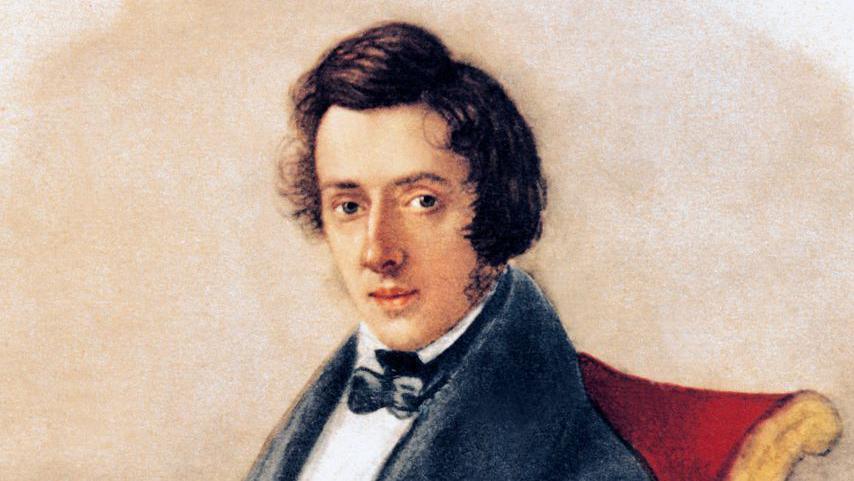Lost Chopin waltz unearthed after almost 200 years

Chopin, who wrote mostly piano solos, died aged 39 in France in 1849.
- Published
A new piece of music believed to be by the Polish composer Frederic Chopin has been discovered nearly 200 years after it was written.
The unknown waltz was unearthed in the vault of the Morgan Library and Museum in New York.
The rare manuscript - dated between 1830 and 1835 - was discovered by curator Robinson McClellan while he was cataloguing new collections.
He then worked with a leading Chopin expert to authenticate the score.
It is not signed by Chopin, but the handwriting includes his distinctive bass clef.
The waltz has minor errors in rhythm and notation but Mr McClellan said he is sure that Chopin is behind it.
"What we're most certain about is it is written in the hand of Chopin, paper that he wrote on himself in his own hand," he told BBC's Newshour.
"What's not entirely sure is that it's music that he composed.
"I feel about 98% sure, and many people who have heard it already feel in their gut this sounds like Chopin."
He continued: "There are atypical aspects of the music, the kind of stormy opening is a little surprising but not entirely out of character.
"And then the melody really to me is where you feel that Chopin quality."
Superstar pianist Lang Lang has recorded the waltz, external for the New York Times, which broke the story.
Chopin, who wrote mostly piano solos, died aged 39 in France in 1849.
He was hounded by hallucinations during his relatively short life and probably had epilepsy, Spanish researchers believe.
'Thrilling' find
Classical pianist Sir Stephen Hough, who performed at this year’s Last Night of the Proms and has recorded all of Chopin’s waltzes, describing him as his “favourite composer”.
“He’s a composer that I feel very, very close to," he told the BBC.
"He, to me, belongs with all the greats absolutely at the top of the pile. So, to find anything from someone you’ve revered in that way for so many years is thrilling.”
He believes this newly-revealed manuscript is likely to be Chopin’s work.
“At first I felt a little doubtful about the authenticity because it seemed a little rough in places, it didn’t quite seem to be as fastidious as Chopin’s other compositions are," he said.
But he aded it was "a little bit like coming across a sketch for a Keats poem that he hasn’t quite finished working out exactly the word order for, and there are a few spelling mistakes, but somehow you can still tell that it has that genius there".
But he does not think it is one of Chopin's "best waltzes", or that it is "one of his worst waltzes" either.
"There’s quite a bit of juvenilia which Chopin kept in a drawer and never intended to publish, which was published after his death against his wishes, and this probably belongs in that drawer," he added.
- Published22 December 2014